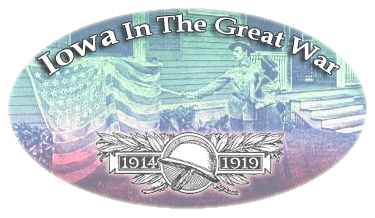|
"FARRAGUT
MOURNS and BURIES SOLDIER HERO".
--The body of Harry Roberts
arrived in Farragut Friday evening from France where it has been
disinterred from the cemetery at Souilly. He was killed during the
fighting in the Argonne Forest on November 2, 1918, just a few days
before the armistice was signed.
Harry was born at Farragut on June 15, 1893, the son of
Mr. and Mrs. E. F. Roberts, and was reared in that community,
graduating from the Farragut schools in the class of 1911. He was a
general, all-around athlete and was well known and universally liked.
He was also a member of the Masonic fraternity.
In company with a number of others from Fremont county,
Harry answered the call to the colors at Camp Dodge on April 25, 1918,
where he was a member of the 88th division. Remaining in this camp
about one month, he was transferred to Camp Travis, Texas, where he was
a member of Company "I", 360th Infantry of the 90th Division.
On June 6, 1918, his organization left Camp Travis for Camp
Mills., New York, and sailed from Hoboken June 13th on the liner
Olympic, landing in Southamption, England, June 22. A short trip across
the English channel landed his organization in France on June 23, l918.
His division immediately took up intensive training in the
more modern modes of warfare and on August 22, his regiment entered the
lines in the St. Mihiel (sic) sector, which was quiet until the morning
of September 12, when the world rejoiced over the first all-American
victory, in straightening out this threatening sector. During this
action Harry was a runner, carrying messages at all times of the day
and night, one of the most dangerous duties a soldier is called upon to
perform. After St. Mihel (sic), the regiment moved back to Toul for a
short rest after which they moved westward to the north and west of
historic Verdun.
The night of October 31 found his regiment in the front
lines in the Argonne and Harry's battalion, under the command of Major
J. W. F. Allen, was in the jump off position ready to go over at five
o'clock the following morning, at which time they stepped over the top.
The battalion met with immediate resistance from four
machine gun nests in the vicinity of Grand Carre farm but these were
soon silenced and the battalion continued pushing its way against
obstinate resistance until about 2:30 in the afternoon, when the
battalion was so worn out and decimated that it was called to a halt
while the second battalion of the same regiment, which was immediately
behind the third, leapfrogged them and continued the drive.
The second battalion continued the advance until about 10:30
that evening when they came to a halt in heavy timber about two
kilometers north of Andevanne and about the same distance south of
Villers-devant-Dun.
On the morning of November 2nd, the second battalion was
given the command to continue the advance and Harry's battalion was
ordered forward to take up the position just vacated by the second.
Just as Major Allen had succeeded in getting his companies
placed in the positions allotted to them, the enemy raked their
territory with a violent artillery fire, supported by a vicious machine
gun barrage and it was this machine gun fire under which Harry gave his
life for his country and humanity. He was wounded in the abdomen about
noon of November 2nd and was immediately rushed to the first aid
station where he was given treatment and from there he was sent by
ambulance to Evacuation Hospital Number 6 at Souilly, where he passed
away shortly after his wounds were dressed.
His body was brought to Farragut Friday evening from Fort Des
Moines in charge of Corporal John L. Jenkins, a member of Troop C of
the 14th U.S. Cavalry.
His father, E. F. Roberts, and three sisters, Mrs. Ward
Corbit, Mrs. W. S. Coy, Jr., and Hazel survive him and mourn his loss,
his mother having passed to her reward on June 20, 1920.
Short funeral services were held at the Farragut cemetery
Sunday afternoon at three o'clock, conducted by Rev. H. D. Herr. A
quartet composed of C.C. Campbell, George Carter, Fred Long and Seth
Cox gave two beautiful numbers.
Pall bearers were Arthur and Harry Coy, Archie Perkins, and
Paul Jones, friends of the deceased, and T. W. Iiams and Samuel
Spittler of Sidney, members of Harry's division overseas.
A large crowd gathered a the cemetery to pay their last
respects to the memory of a young man who was liked and admired by all
who were privileged to know him.
Interment was made by the side of his mother in Farragut
cemetery.
-source: The Fremont County Herald, Sidney,
Fremont Co., Iowa;
04 August 1921
|


 Harry Roberts
Harry Roberts